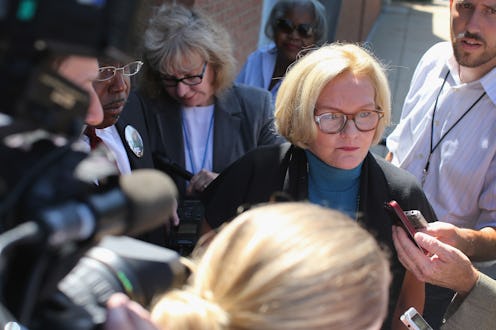News
How A Claire McCaskill Town Hall Taught Me A New Way To Resist Trump

If Paul Ryan and Donald Trump's recent failure to repeal Obamacare can teach us anything, it is that getting involved matters. Constituents opposed to the American Health Care Act (AHCA) flooded their representatives with phone calls when the GOP-replacement plan was introduced. According to The Washington Post, there were 50 calls opposing the healthcare bill for every one in favor. In the wake of the 2016 presidential election, many Americans have started to get involved in politics for the first time. From the millions who marched for women after the inauguration, to the protesters and lawyers who flooded airports after Trump imposed a travel ban, political engagement is more common than ever.
I regularly call my elected officials with my concerns about issues like Planned Parenthood funding and Cabinet nominees, but one thing I hadn't yet tried was showing up in person. So, when I received an email that the office of Missouri Sen. Claire McCaskill would be hosting a "kitchen table talk" near my family's home for constituents to voice their concerns, I decided to make the trip and see what it was like to turn out in person for the issues I cared about.
Sen. McCaskill herself was not at the Monday meeting — her office told me she is in Washington D.C.
Instead, the event was hosted by a member of her local staff, Brendan Fahey, and held in a meeting room at a local library. Each of the roughly 25 people in attendance were given the floor in order to voice their concerns. In each case, Fahey promised to share the comments with McCaskill; he also frequently responded by explaining the senator's position on an issue, or, when applicable, previous work she had done.
Healthcare was a commonly discussed issue: everyone who spoke about the issue was opposed to AHCA (like the senator herself), but there was a wide range of views about what did or did not need to be changed about existing law. Several of the people who spoke had extensive work experience in the healthcare or health insurance industries, and it was very interesting to watch people with such substantive policy knowledge debate an issue.
Moreover, people's concerns might not be what you'd expect from looking at them. For example, the most vocal Planned Parenthood supporter in attendance was a man, and an elderly man was the sole voice about climate change, something often considered to be a millennial issue. (Millennials themselves were in short supply at the meeting, possibly because it was held at 10 a.m. on a weekday. The only young person I saw was a high school student, there with a parent and presumably on spring break, who was also the kitchen table talk's only voice about gun control.)
The importance of showing up in person was underscored most by a group that came to address a concern that is rarely a topic of national conversation — but that apparently matters very much to many Missourians.
A large number of people in attendance came to speak out about sheltered workshops, which are workplaces that enable disabled people to work, under supervision, for pay. State-approved workshops are permitted to pay these employees less than the minimum wage, which proponents argue allows these businesses to remain afloat.
The large contingent at the meeting were made up of supporters of sheltered workshops, including many parents of adult children with disabilities and the CEO of Lafayette Industries, a large workshop in Missouri. By turning out to address Sen. McCaskill's staff in person, that group made it clear that the issue was deeply important to them — and that they'd likely be following her actions on that topic in the future.
Sheltered workshops — likely not a key issue for many voters — were one of the biggest concerns at the meeting. This also increased awareness about the issue amongst the other politically-minded people in attendance. It's an issue I knew almost nothing about on Monday morning, but now I'm eager to research it more thoroughly and understand this issue.
After seeing the passion and even policy expertise of many of my fellow Missourians, I now feel empowered to ask my elected officials for the policies I want. I am excited to have a new way to protest and persist in my repertoire, and I'm looking forward to showing up for the issues that matter to me again in the future.